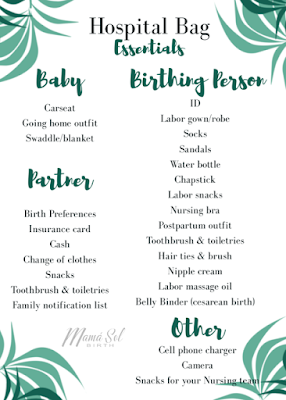What To Pack In Your Hospital Bag - The Essentials
I've reached that point during the third trimester where I often find myself feeling physically done with this pregnancy journey and daydreaming over what our birth will unfold to be but also falling into that instinctual, elaborate worrying over the uncertainty that is birth.
Yes, even doulas and birth professionals feel these emotions in the weeks leading up to our birthing time. I'd venture to say almost all birthing folks encounter these moments at some point. Moments that urge us to do the mental work so we can make space for the vast range of emotions we'll sit with during labor and regardless of how we eventually go on to birth, this emotional work is one of the common threads that bind us as a community of birthing people.
Around this time with each of my pregnancies, probably like others expecting tiny humans, I've also found myself drawn to nesting and the preparation of the things which are within my realm of control. The ritual of preparing our home and packing my hospital bag are great physical reminders of my growing readiness for this transition.
Much like the emotional work, this ritual preparation is something that comes up for nearly all birthing folks and what they actually need* and should pack for the hospital or birth center is a question that pops up routinely in parenting communities.
So to help you get a head start I've shared my doula and mama, essentials only packing list.
I won't go through the entire list - some of these require little explanation but there are a few I'd like to highlight and also a few things I've packed which aren't included because they may be things your doula will have on hand for you.
- Birth preferences - By now we all know these aren't intended to act as a script for labor, but they are helpful to the care team at your place of birth and to your chosen birth team during the ladder stages of labor. I usually recommend to the families I work with that they discuss their birth preferences ahead of time with their Midwife or OB and have them initial the copy they'll provide to the nursing team upon arrival at their place of birth.
- Family notification list - Although the days that follow will bring their own memorable moments, nothing can replace those first hours with your new baby and what's it like to meet and feed them for the first time. Have a list on hand for your partner or doula that explains who to call and when. Your extended family will have plenty of time to meet the baby, so go ahead and be a little selfish during those first hours or days.
- Labor Gown - I think many assume they have to wear the hospital gown if they are birthing at hospital, but it's your birth and you should wear what you want (or don't want for that matter). It's really as simple as that.
- Chapstick & Nipple Cream - Pro Mama Tip** Not only is Motherlove Nipple Cream my go to for postpartum, but it actually doubles as a great chaptstick! It's lanolin free and doesn't contain any Vitamin E (which shouldn't be ingested by infants) so no need to wipe the nipple clean prior to a feeding.
- Labor Massage Oil - Massage and acupressure can be great tools for coping during labor surges. I'll be packing this labor oil also from Motherlove which is safe for use even with perineal massage and postpartum on baby.
- Belly Binder - Although these are most frequently recommended for those who have cesarean births, all birthing folks can benefit from postpartum belly support regardless of how they birth their babies. There are few options when it comes to belly support too: you can request one from your postpartum nurse during your hospital stay, purchase from one of the big box brands like Belly Bandit, or you can contact a local doula or postpartum birth worker who is well versed in traditional belly binding and closing of the bones. If you're local to Orange County feel to email me for recommendations**
- Labor snacks - This can sometimes be a hot topic with your care team if you are planning a hospital, but you should know there is evidence to support the birth person having access to liquid and snacks during labor if they want them. Some popular options for the laboring person are honey sticks and flavored waters labor aides. If you're looking for some information to help launch this discussion with your OB, start here https://evidencebasedbirth.com/evidence-eating-drinking-labor/ or here https://www.asahq.org/about-asa/newsroom/news-releases/2015/10/eating-a-light-meal-during-labor
- Rebozo - if you've chosen to have a doula join your birth team they'll most likely have a rebozo in tow to use as needed during labor. If you're like me though, you may already have a rebozo that's meaningful to you or this pregnancy journey so be sure to pack it it your birth bag if you're not choosing to birth at home. These are great tools for comfort and aid during the labor. Not familiar with rebozo use? Start here https://evidencebasedbirth.com/rebozo-during-labor-for-pain-relief/
- Flameless candles - Did you know there's actually a biological basis for our desire to birth in the dark like most mammals choose instinctively. The darkness produces a hormone called melatonin which in turn promotes relaxation! Which is exactly what we want for the laboring person, deep relaxation during and in between labor surges. A great way to achieve minimal lighting in a hospital setting is to bring your flameless or string lights and turn off the the bright overhead lighting and close the windows.




Comments
Post a Comment